Previously on Drokk!: As we’ve reached the early 1990s, we’ve said goodbye to Garth Ennis and hello to the next generation of Judge Dredd writers in 2000 AD — including none other than a very young Mark Millar. Thankfully, over in the Magazine, John Wagner has returned to save us all.
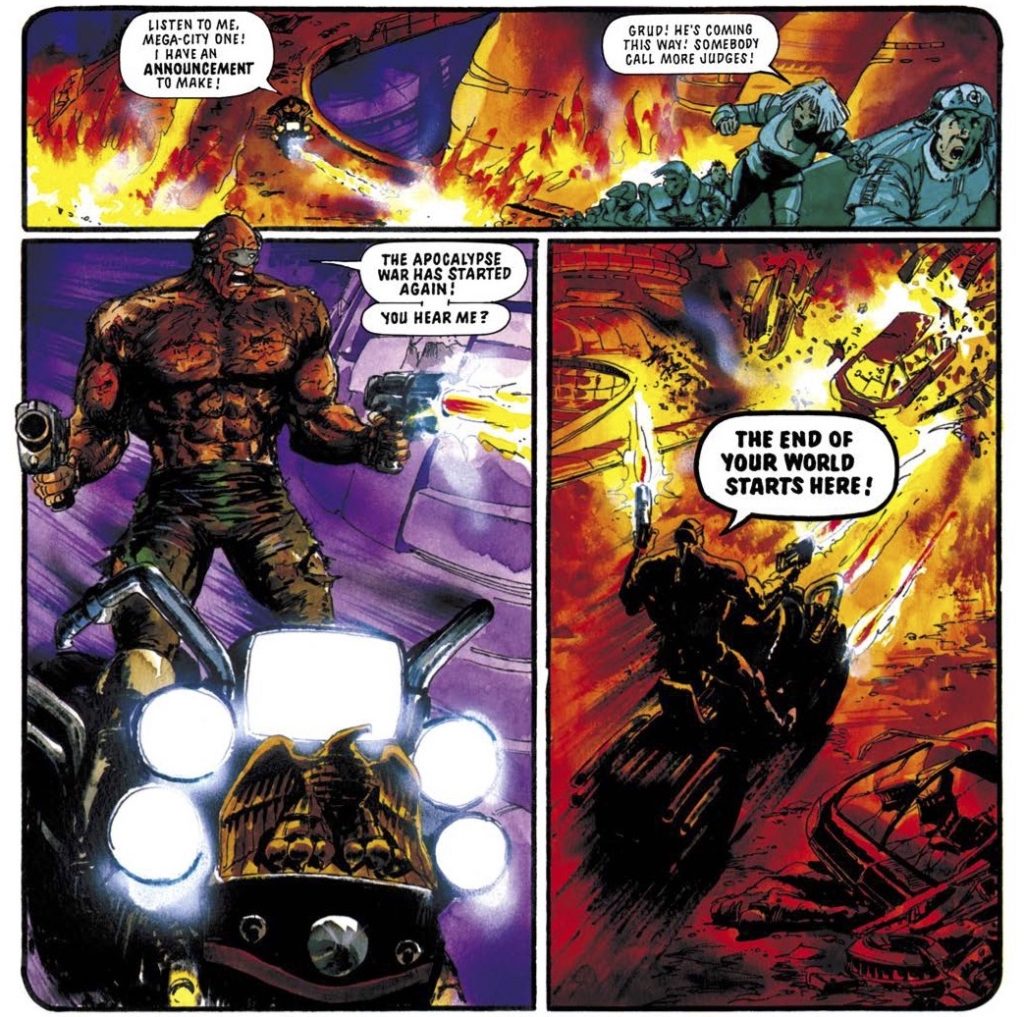
0:00:00-0:03:30: We introduce ourselves and admit our lack of fondness for at least half of the book we’re covering in this episode, Judge Dredd: The Complete Case Files Vol. 20, which covers material from 1993 and 1994’s 2000 AD and Judge Dredd: The Megazine issues. It’s… not exactly a high point, at least where the 2000 AD episodes are concerned.
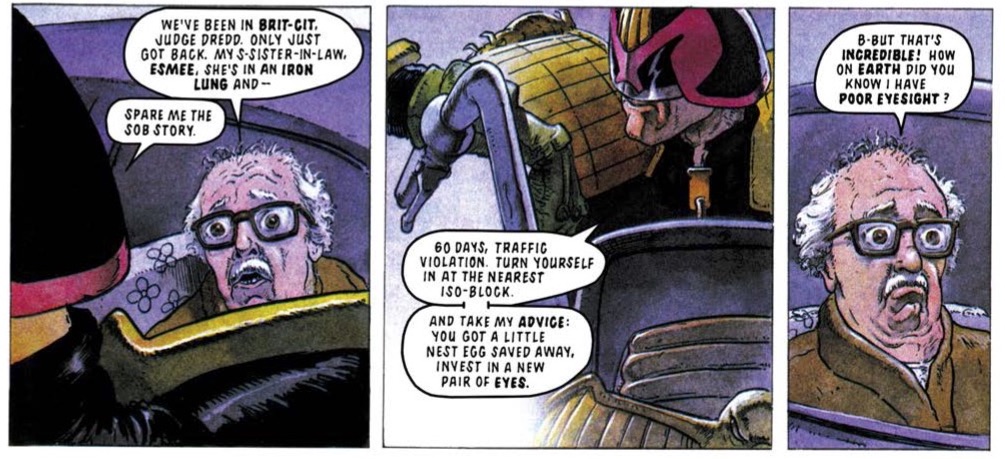
0:03:31-0:07:03: Before we get to just how shockingly, appallingly bad the majority of the 2000 AD episodes are this time around, we talk about the one 2000 AD story in the book that we enjoyed: “Roadkill,” written by John Smith, who has turned out to be a bright spot amongst a dark time for 2000 AD writers.
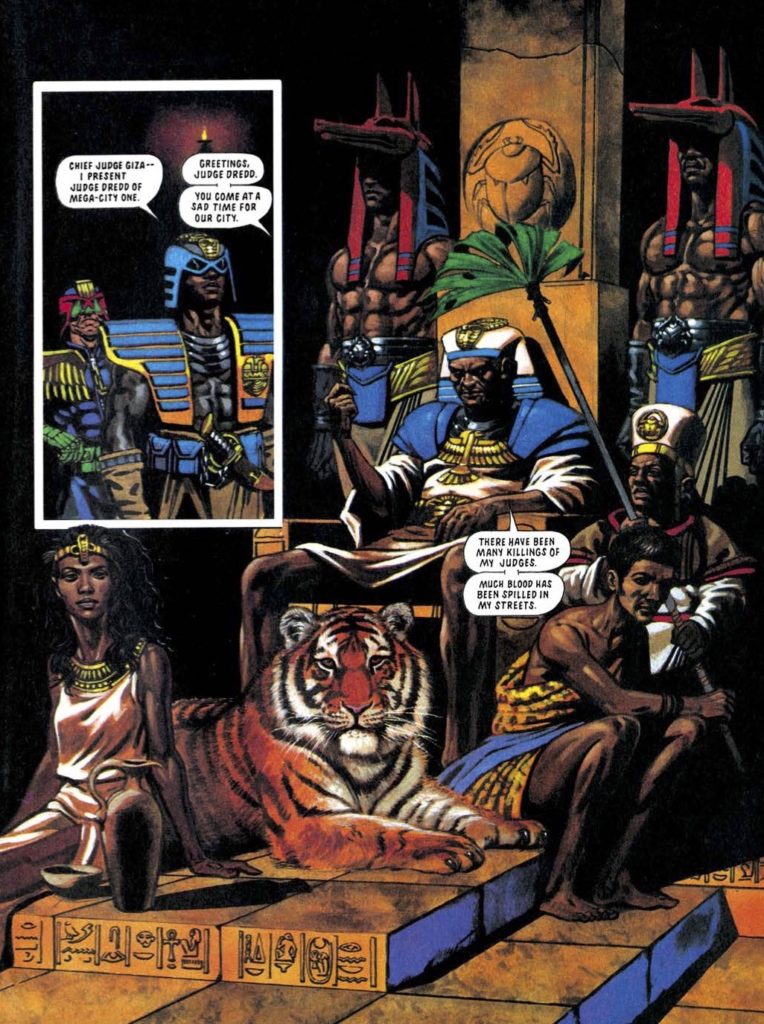
0:07:04-0:44:12: Why is the 2000 AD material so bad this time around? The answer might be found in Jeff’s description of the book as “the most consistently racist volume” in the series to date, with so many of the 2000 AD stories being racist in a variety of ways, each of them genuinely breathtaking in something published so relatively recently. We talk about that, and also the fact that both of us feel as if the 2000 AD material is skewing younger than it has before, even when 2000 AD was officially a “kids’ comic.” Is that because the stories are more simplistic in format and execution, that they revolve around high concept hooks, or that there’s an absence of the ambiguity and complexity that Wagner and Grant brought to the strip in their heyday? Also under discussion: the ways in which Millar (and Grant Morrison, who co-writes one of the serials in this collection) imagine threats to Dredd, and how flawed their understanding of structure and pacing is when it comes to the longer storylines. And just who Sonny Steelgrave, and why is he terrible?
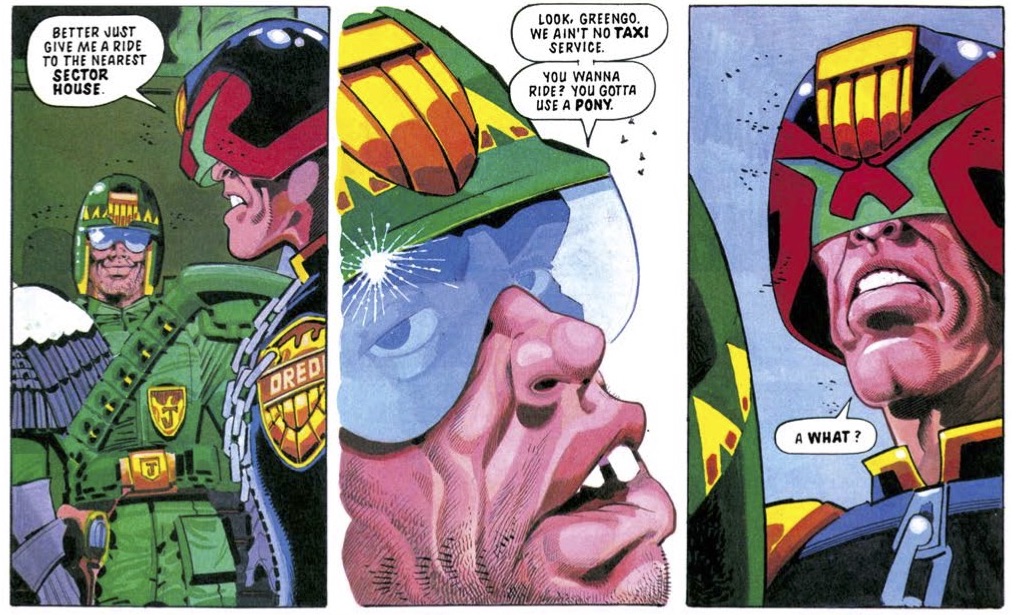
0:44:13-0:50:00: It’s not just Mark Millar who’s disappointing in the 2000 AD stories in this book, and we talk about whether or not they’re at least more interesting than the Garth Ennis era of Dredd stories. (We differ on this, I think.) “The first half [of this volume] was genuinely excruciating,” Jeff says, and he’s not wrong about that.
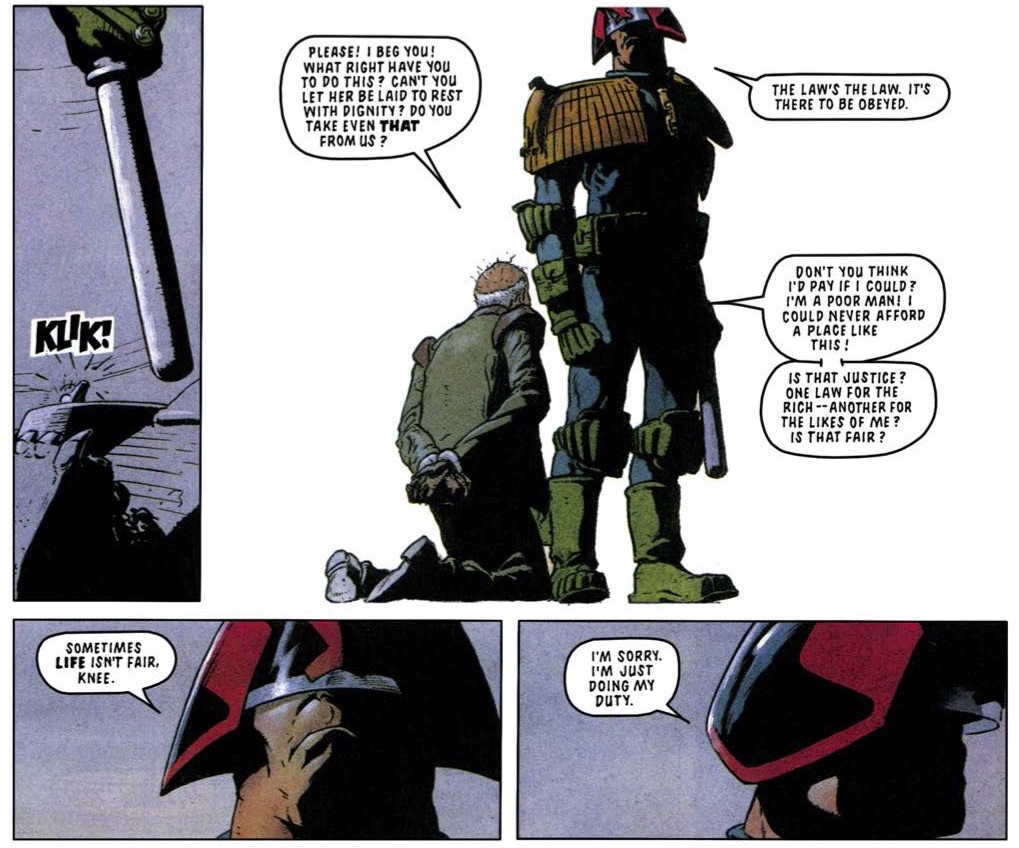
0:50:01-1:08:19: All isn’t lost, however, and the Magazine stories in this collection turn out to be pretty uniformly good — with one exception that we talk about briefly — thanks to John Wagner having a really strong period around this time. The first of three truly great Wagner stories in this book, “Bury My Knee At Wounded Heart,” is the first to draw our attention, and it brings us to talk about Dredd’s unusual display of moral cowardice, the wonderful staging of the scene by Peter Doherty, and what it means for Dredd to experience shame for perhaps the first time in the character’s history. We also do a quick rundown of all the Magazine stories in this volume, and Jeff explains why “Do The Wrong Thing” flubs what could have been an important response to the racism as displayed in the 2000 AD stories this time out.
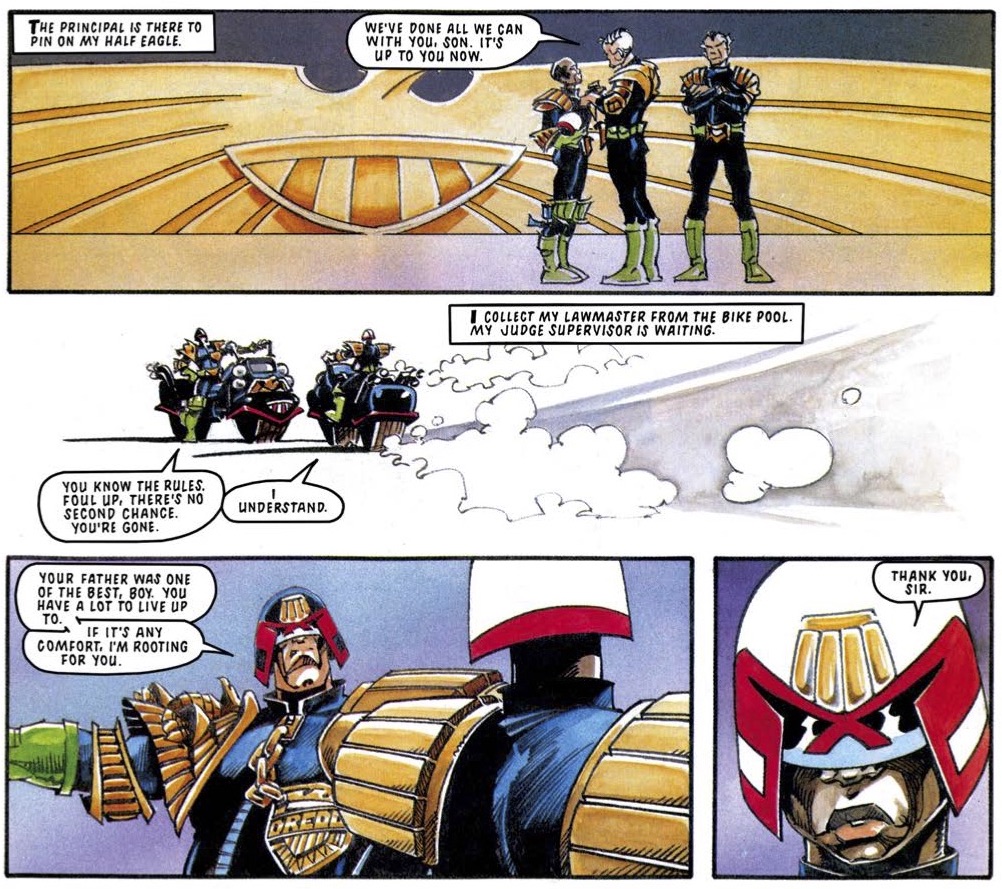
1:08:20-1:25:10: The second great Wagner story is “Giant,” and we talk about the ways in which it stacks up against similar stories in the strip’s past — and there have been a bunch — while also quietly building on them, and displaying a potential shift in the way that Wagner is thinking about not only the way the Justice Department runs, but also the way that it should run, with this story offering a couple of wonderfully subtle criticisms of the status quo to underscore just how unsubtle Dredd has been in recent years.

1:25:11-1:41:08: Perhaps the most amazing, unexpected strip of the entire volume is saved for last, with Wagner and Mick McMahon’s “Howler” being unlike anything else in the history of the Dredd strip, and all the better for it. We talk about the “weird performance art” aspect of it, but really, I should just share images, because that says it all.
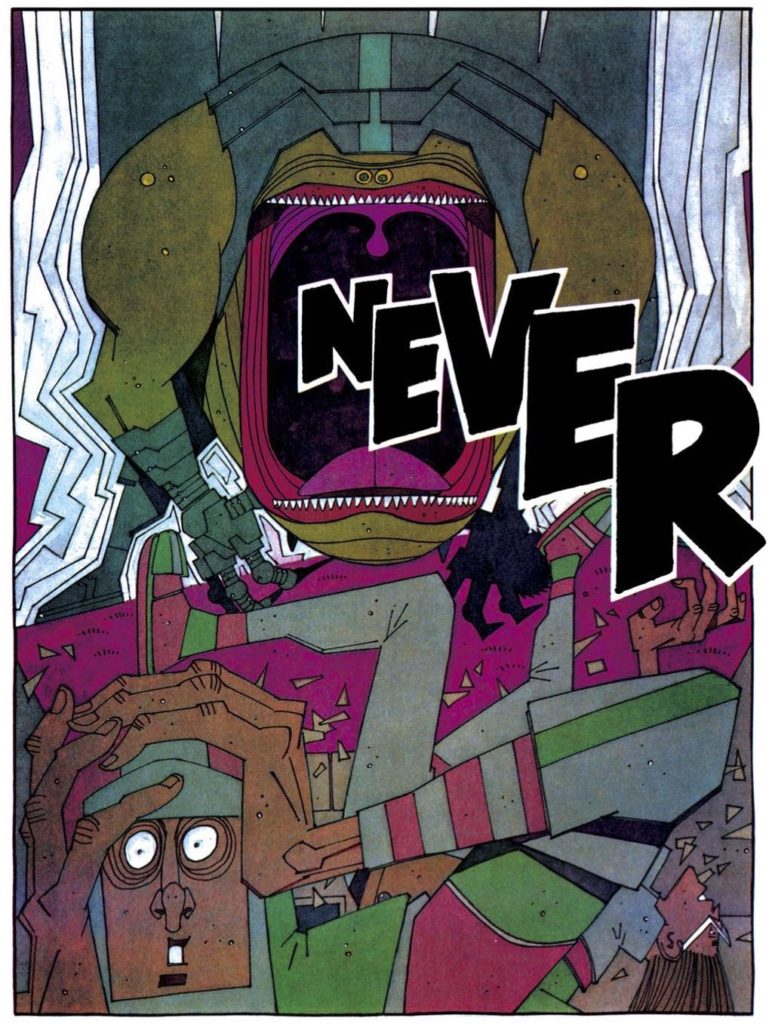
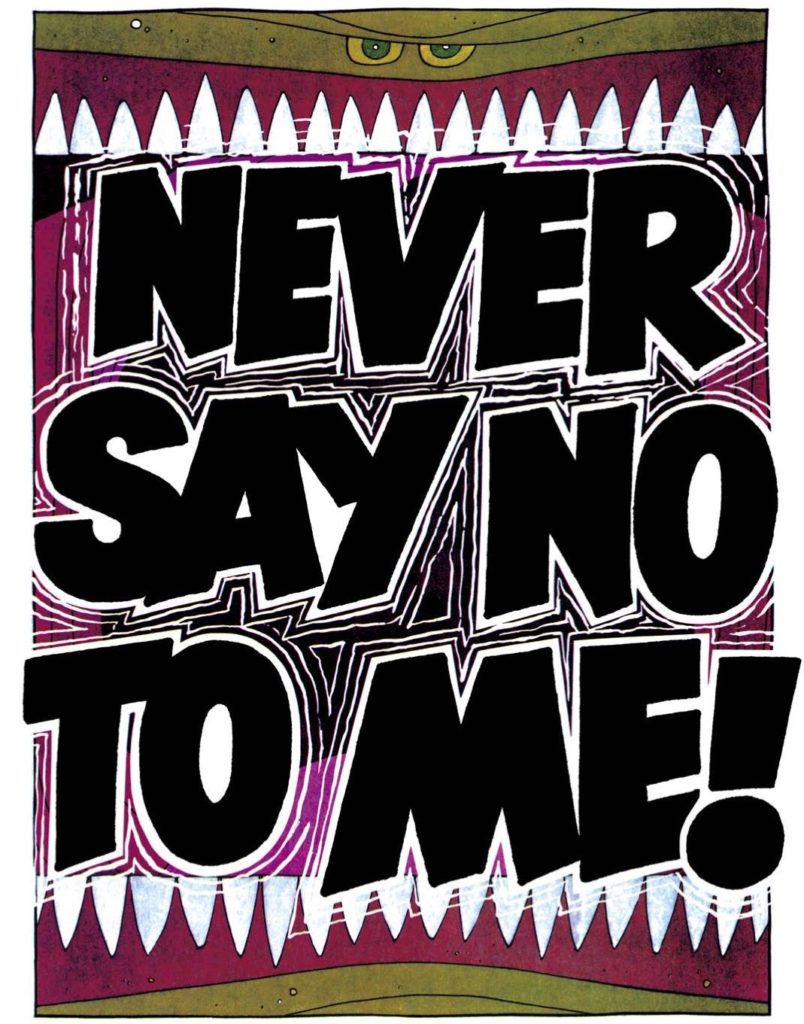
1:41:09-end: Is this volume Drokk or Dross? It’s a surprisingly close run thing, but not nearly as close is our choice of favorite Wagner and non-Wagner strips in the volume. From there, we close things up by talking briefly about what’s to come, and then wrapping things up with the traditional mention of our Tumblr, Instagram, Twitter, and Patreon accounts, and that’s it for 2020’s Drokk!s. As ever, thank you for reading and listening along; you’re all the greatest, even when the stories are not.
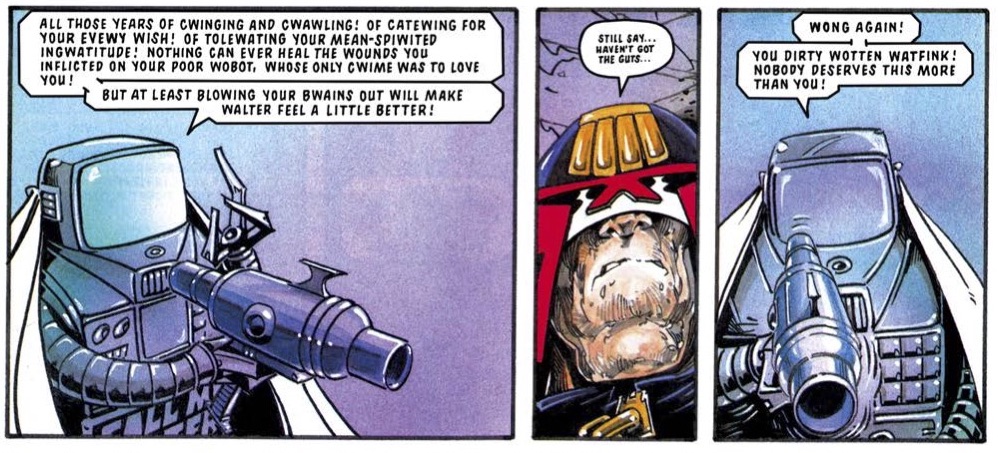


And for those looking for the direct link: https://theworkingdraft.com/media/Drokk/DrokkEp23.mp3
Happy Holidays indeed.
I love The Howler too! That entitled jerk at the top of Sump Tower demanding everyone obey him, causing untold death and chaos by just going on and on and on, finally getting his comeuppance and destroying himself is such an apt way to end Drokk! in 2020.
Ah jeez, why didn’t this occur to me—this is a beautiful point, David!
I enjoyed Roadkill as well. It felt very classic Dredd. Noticeable was the absence of an ironic twist, though. I was pretty much expecting the story to end with Merv’s brain in a car, but no. I did wonder about the amount of weapons available at a garage though. That led me on to wonder if we ever see Citi-Def do anything that isn’t destructive lunacy. Considering the things the Justice Dept does not allow, they are pretty tolerant of their citizens stockpiling deadly weapons.
Given the appalling racism of Sugar Beat I’m a little ashamed I kept being puzzled by Ms Testarossa’s teeth. I also found myself speculating about how the story would have been different if Pat Mills had written it. It would have still been racist, but it would also have mentioned the historic links between sugar plantations and slavery and shown how selfish consumers in Mega City One support the criminal organisations that oppress and impoverish the people of the lands where they are based.
(Reply to David M, since the gods have decreed that threading shall cease)
I think that’s what makes The Sugar Beat so extraordinarily awful, my entry for “The Worst Judge Dredd Story Ever.” It’s not just racist. There’s nothing to it except the racism, nothing else you can point to that the story is about. It’s putting Dredd in a very bad ‘80s action movie about drugs with horrible South American stereotypes, without any other animating idea to it whatsoever.
I think the Ciudad Baranquilla story makes for an interesting contrast. That trades in very similar stereotypes, obviously (Yes, the Sugar Beat couldn’t even be original when it was being racist), but there is at least some sense there that it’s also about US relations with Latin America.
Scattered thoughts:-
– Just to agree with our hosts: the whiplash inflicted by the vast gulf in quality between the 2000 AD and the Megazine sections of this is probably dangerous. There’s hardly any sense in which one can reasonably say that these are the same stories about the same character.
One thing that adds to that is that this feels like Wagner has climbed out of a hole and is making progress again. I wasn’t as fond of Mechanismo as our hosts, and their discussion about these stories — of which I am every bit as fond as they are — helped me put my finger on why.
Mechanismo works as a commentary on the static cartoon character that Dredd can be. But that calls for Wagner or someone else to move Dredd himself as a character decisively forward from that. In the Mechanismo, Dredd objects to the robots, but it’s not really clear *why*, where that’s coming from in how Dredd thinks about the world — and as long as that element isn’t there, the story is missing one of its most important pieces. We’re still where we were with City of the Damned and Wagner not writing “Twilight’s Last Gleaming” — it’s as if Wagner thinks that if he goes just that little bit too far, he’ll break the character.
Up till now, that is — this volume contains the most interesting Wagner stories in quite a while. And there’s something delightfully Dredd about the fact that one of the two key stories has a terrible play on words for its title, and the other turns on Walter the Wobot.
– Our hosts suggest that Millar is modeling his Dredd on the Daily Star strips. I assume that’s based on something Millar said at some point about that being where he knew the character from. But I think there’s also something else — Millar’s Dredd reads like it’s to a significant degree taking Ennis’s Dredd and trying to replicate it in a Millaresque way. He has rather a lot of moments where Dredd is theToughest Person Ever!, just like Ennis — the difference is that Ennis took that deeply seriously, while Millar gives the impression of thinking, “Is that what people like about this character? Right, I’ll give them that” in a way that comes across as being cynical and hollow, but by that token actually a bit more healthy.
I’m influenced here by an upcoming story, which contains something that absolutely has to be a riff on an Ennis creation, and I’d argue is a negative commentary on it. (But is in a story jointly written with Morrison, admittedly.)
But I think there’s maybe something not dissimilar, if perfunctory, going on in Frankenstein Division. The thing is, I don’t think these Sov judges are actually being treated as much like comedy characters as *Ennis’s* were. In particular, I think it’s striking that Ennis gives them names that, because they’re drawn from real people like Andropov, are instantly recognizable as actual Russian names in contrast to the likes of “Traktorfaktori.” It’s all relative, obviously, and there’s a lot of cartoonishness and comedy “comrade” dialogue – but the basic story here is about taking the Sov judges seriously as a threat and it ends on a moderatly serious, morally ambiguous note. At least by Millar standards, the story is at least *trying* to be a decent follow-up to the Apocalypse War.
– I thought our hosts were a bit harsh on a couple of the more minor Megazine stories. Freefall! is a story that might, I think, seem very strong if it weren’t in such close proximity to two of the best Wagner stories ever. And It’s a Dreddful Life is throwaway fluff for the longtime fan, but I didn’t hate it. One interesting thing about it, for me, is that Jim Alexander and Robbie Morrison evidently derived the same impression from Top Dogs that I did, that Johnny Alpha was going to become a permanent recurring antagonist in Dredd’s world. Unless that actually was the plan at this point?
That should be “Millar gives them names,” obviously. Aagh! for an “edit” button!
I too felt so indebted to Wagner for his work in this volume that I wanted to throw a parade in his honor. “Road Kill” was an auspicious start to this volume, until the moment I turned the page to the Egypt story and saw the credited writers of Miller and Morrison. My gut told me this story was going to be racist and pretentious with touch of Silver Age comics told through the prism of an out-of-character Dredd. They did not disappoint on that front, much to the detriment of the reader. I shudder to think what the quality of the other strips in 2000 A.D. were like at the time if this is how the editors let M&M do Dredd.
I think our hosts said everything that needed to be said about “Sugar Beat,” but I was struck between the parallels between this story and the first story arc in the start of The Punisher’s ongoing series back in the late ’80s. In that, Frank Castle goes undercover to infiltrate a South American drug cartel, if memory serves. It’s as problematic as some of the movies of the time that had similar stories, but “Sugar Beat” make that Punisher story look like high art in comparison, and much, much more progressive in that its racism dial is on a much lower setting.
In the Cadet Giant story, I found myself rooting for Giant, but at the same time I questioned why I was rooting for someone to become a successful member of a fascist gestapo. I guess that just goes back into what Wagner said about Dredd both being the hero and the villain of the series.
Finally, I wonder if other creators are afraid to take Dredd forward in ways that Wagner can. I don’t think the “Wounded Heart” story would be beyond the abilities of some of the writers in this volume, but either nostalgia or respect for Wagner prohibits them from developing Dredd in the same way. Or maybe it’s editorial fiat. I don’t think all the creators are untalented, so there must be some reason why they can’t do a Dredd story like Wagner.
I was genuinely worried that the appalling quality of some of the Dredd stories of this era would put an end to the podcast altogether, before our illustrious hosts got into rarely-discussed stories like The Pit and Doomsday, but it’s good that there is just enough Wagner to keep things going.
It’s a little weird that the Megazine stories are so good, because my memory of that title at the time is that it was 10 pages of Dredd brilliance, and a lot of trash stories that didn’t go anywhere, by a lot of young talent who were still finding their feet. It was necessary to bring in new blood at this time, and a lot of them would go on to do great stuff for both 2000ad and the Meg, but it gets pretty rough at this time.
Actually, is this the first time Gordon Rennie’s name comes up? I’d be fascinated to know if someone like Jeff, coming to this for the very first time, would see anything in Rennie’s stories that indicates he will become the main Dredd writer for a while (Wagner literally pointed to him as the future of Dredd at one point), or if he’s just another Millar/Ennis wannabe.
Ah, see, this is where I needed to be even more ignorant about Dredd; I somehow had tumbled to the fact that Rennie was a relatively big name. During the two years I had a digital subscription to 2000AD close to ten years ago, Rennie’s name popped up a lot. He and Robbie Morrison are both dudes I clock as Dredd writers and as good ones…though that extra bit of him being the future of Dredd was something I didn’t know.
So he didn’t have much of a chance to make an impression this time around…but I admit to having an eye on him?